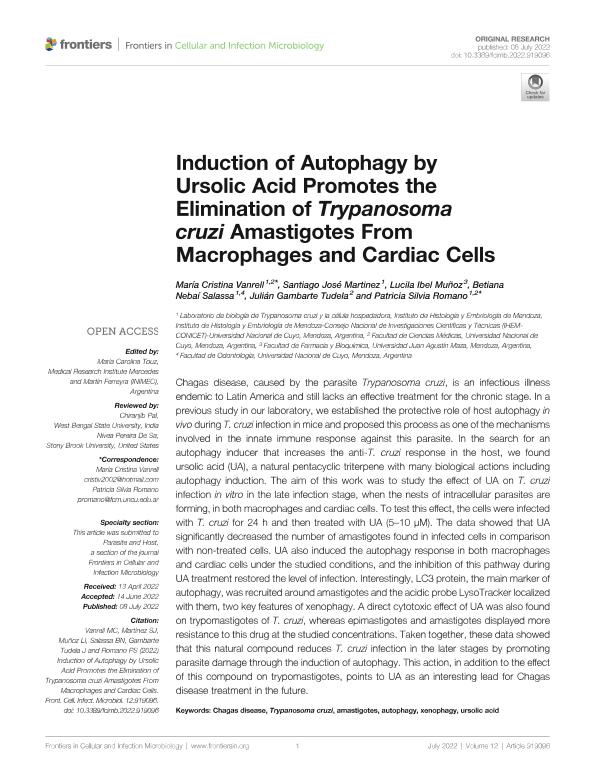Artículo
Induction of Autophagy by Ursolic Acid Promotes the Elimination of Trypanosoma cruzi Amastigotes From Macrophages and Cardiac Cells
Vanrell, Maria Cristina ; Martinez, Santiago Jose
; Martinez, Santiago Jose ; Muñoz, Lucila Ibel; Salassa, Betiana Nebaí
; Muñoz, Lucila Ibel; Salassa, Betiana Nebaí ; Gambarte Tudela, Julian Alberto
; Gambarte Tudela, Julian Alberto ; Romano, Patricia Silvia
; Romano, Patricia Silvia
 ; Martinez, Santiago Jose
; Martinez, Santiago Jose ; Muñoz, Lucila Ibel; Salassa, Betiana Nebaí
; Muñoz, Lucila Ibel; Salassa, Betiana Nebaí ; Gambarte Tudela, Julian Alberto
; Gambarte Tudela, Julian Alberto ; Romano, Patricia Silvia
; Romano, Patricia Silvia
Fecha de publicación:
07/2022
Editorial:
Frontiers Media
Revista:
Frontiers in Cellular and Infection Microbiology
ISSN:
2235-2988
Idioma:
Inglés
Tipo de recurso:
Artículo publicado
Clasificación temática:
Resumen
Chagas disease, caused by the parasite Trypanosoma cruzi, is an infectious illness endemic to Latin America and still lacks an effective treatment for the chronic stage. In a previous study in our laboratory, we established the protective role of host autophagy in vivo during T. cruzi infection in mice and proposed this process as one of the mechanisms involved in the innate immune response against this parasite. In the search for an autophagy inducer that increases the anti-T. cruzi response in the host, we found ursolic acid (UA), a natural pentacyclic triterpene with many biological actions including autophagy induction. The aim of this work was to study the effect of UA on T. cruzi infection in vitro in the late infection stage, when the nests of intracellular parasites are forming, in both macrophages and cardiac cells. To test this effect, the cells were infected with T. cruzi for 24 h and then treated with UA (5–10 µM). The data showed that UA significantly decreased the number of amastigotes found in infected cells in comparison with non-treated cells. UA also induced the autophagy response in both macrophages and cardiac cells under the studied conditions, and the inhibition of this pathway during UA treatment restored the level of infection. Interestingly, LC3 protein, the main marker of autophagy, was recruited around amastigotes and the acidic probe LysoTracker localized with them, two key features of xenophagy. A direct cytotoxic effect of UA was also found on trypomastigotes of T. cruzi, whereas epimastigotes and amastigotes displayed more resistance to this drug at the studied concentrations. Taken together, these data showed that this natural compound reduces T. cruzi infection in the later stages by promoting parasite damage through the induction of autophagy. This action, in addition to the effect of this compound on trypomastigotes, points to UA as an interesting lead for Chagas disease treatment in the future.
Palabras clave:
AMASTIGOTES
,
AUTOPHAGY
,
CHAGAS DISEASE
,
TRYPANOSOMA CRUZI
,
URSOLIC ACID
,
XENOPHAGY
Archivos asociados
Licencia
Identificadores
Colecciones
Articulos(IHEM)
Articulos de INST. HISTOLOGIA Y EMBRIOLOGIA DE MEND DR.M.BURGOS
Articulos de INST. HISTOLOGIA Y EMBRIOLOGIA DE MEND DR.M.BURGOS
Citación
Vanrell, Maria Cristina; Martinez, Santiago Jose; Muñoz, Lucila Ibel; Salassa, Betiana Nebaí; Gambarte Tudela, Julian Alberto; et al.; Induction of Autophagy by Ursolic Acid Promotes the Elimination of Trypanosoma cruzi Amastigotes From Macrophages and Cardiac Cells; Frontiers Media; Frontiers in Cellular and Infection Microbiology; 12; 7-2022; 1-12
Compartir
Altmétricas



